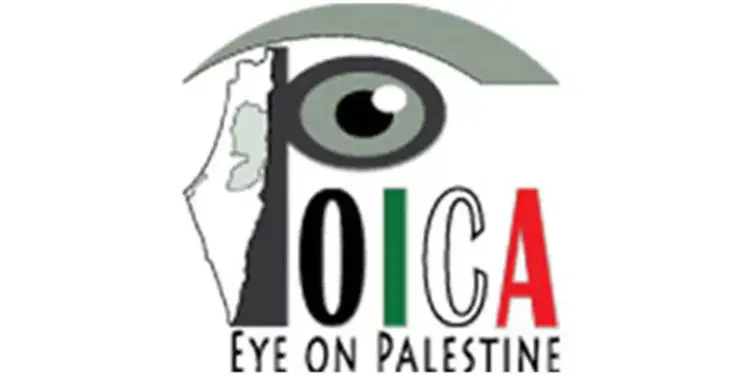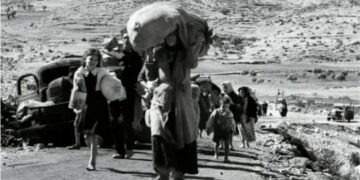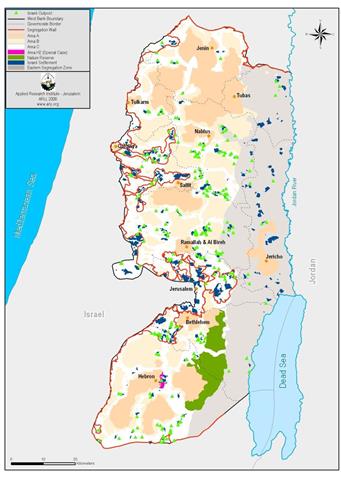Introduction
Freedom to practice religion has always been an issue with the Palestinian under Israeli occupation. Procedures adopted by the Israeli Army have hindered Palestinians’ right to practice their prayer rituals on more than one level. More than that, the Israeli Army has also targeted Palestinian religious sites and its surrounding under the pretext of security. The ban on Palestinian from accessing religious sites in Jerusalem and Hebron started to become more evident when Israel started its Jerusalem isolation plan in 1993, right about the time when checkpoints started to establish on Jerusalem’s entries. From that time on, Israel adopted stricter policy with regard to Palestinians entering occupied East Jerusalem under the pretext of security, as Palestinian wanting to enter Jerusalem must be in possession of a special permit issued from the Israeli civil administration that is if they have a clean bill of security.
The Israeli ban on Palestinians was empowered gradually, as Palestinians of age between 16 and 40 where not allowed to enter, after which the restriction on age varied from time to time but it always was from the age of 16 to 30, 35, 40, 45 and it was also associated with the status of the individual, if married or not or with or without children.
As the years went by, obtaining permits to enter Jerusalem became a very exhausting and near impossible process and thus people looked for other alternative ways to enter Jerusalem to reach Al-Aqsa Mosque. However, even those alternative ways became harder to access as the Israeli Army has tightened the grip around Jerusalem and now with the Segregation Wall, Jerusalem has become very isolated from the Palestinian population.
The Israeli restrictions on religious practice were also carried out against the Palestinian Christians who also were denied access to Jerusalem for religious purposes, even though at some point the Israeli civil administration used to issue entrance permits to Jerusalem for the Palestinian Christians at religious occasions, but the number of permits declined by year from thousands to less than 50 in Holy Cross holiday on September 27, 2006.
Al Ibrahimi Mosque in Hebron has also been a subject of religious ban for the Muslims population in Hebron governorate, especially at the time of Jewish religious holiday, as entrance to the Mosque becomes restricted to Jews and the Israeli Army take control of several Palestinian houses to tighten the control of the Mosque’s vicinity.
Denying freedom of Religion
With the beginning of the holy month of Ramadan on September 23, 2006, the Israeli Army has tightened the restrictions around Al Ibrahimi Mosque in Hebron and Al Aqsa Mosque in Jerusalem, in order to restrict and prevent the Palestinian worshippers from reaching them, a procedure that has became a ritual procedure with every Muslim or Jewish holiday every year.
In Hebron, the Israeli Occupation Forces closed the Ibrahimi Mosque four times since the beginning of Ramadan under the pretext of security for Jewish prayers heading for the Mosque to commemorate the “Jewish Yom Kippur holiday”. More over the Israeli Forces had intensified the security measures all around the Mosque and on every road that leads to it. The tightened Israeli security measures include installing electronic gates and physical inspection of worshippers before they lineup to gain access to the Mosque. These provocative and repressive Israeli procedures have led at many occasions to inflame clashes between the local residents and the Israeli soldiers.
In Jerusalem, the Israeli Army in cooperation with the Israeli border police adopt measures to restrict Palestinians entrance to Jerusalem for the Friday prayer of Ramadan, which is perceived the holiest month of the year for the Muslims. This year, the Israeli has brought their restriction to unprecedented levels, as Clashes erupted between Israeli soldiers and Palestinian young men on every Friday, after the Israeli police denied Palestinian Muslim worshippers’ entrance to Jerusalem for the Friday prayer.
Israeli Army and border Police completely banned West Bank residents under the age of 45 from entering Jerusalem so was the case for Jerusalem residents age 45 or older only were allowed entrance, which compelled the angry worshippers, some of them injured to start their prayer service in the street.
The Israeli Army and border police has declared their highest state of alert, fearing that the prayers for the last Friday of the holy month of Ramadan will turn bloody if the political Israeli establishment continue to refuse Palestinian prayers entrance to go to Jerusalem.
Legal & International Status
Israel is prohibited under international law to deny the Palestinians and their right of “freedom of religion”.
Article (38) of the Fourth Geneva Convention provides that: 'Protected persons under occupation shall be allowed to practice their religion and to receive spiritual assistance from ministers of their faith.'
Article (13) of the Fourth Geneva Convention provides that: 'The populations of the countries in conflict, without any adverse distinction based, in particular, on race, nationality, religion or political opinion, and are intended to alleviate the sufferings caused by war.'
Article (18) of the Universal Declaration of Human Rights in 1948 reads that: 'Everyone has the right to freedom of thought, conscience and religion; this right includes freedom to change his religion or belief, and freedom, either alone or in community with others and in public or private, to manifest his religion or belief in teaching, practice, worship and observance'.
Israel denying Palestinian rights to access the religious sites is an outrageous violation of their rights. Israel continued policy to isolate Jerusalem and deny Palestinians access to the city under the pretext of security is in fact part of the Israeli plan to isolate and separate Jerusalem from the West Bank and to clear of all shades of religious freedom and confine it to Judaism. On the political level, Jerusalem is the core of the anticipated Palestinian state and its economy, which motivates Israel even more amputate the city from its natural extension in the West Bank in order to put an end to the Palestinian dreams of an independent and viable State.
Prepared by
The Applied Research Institute – Jerusalem
ARIJ












